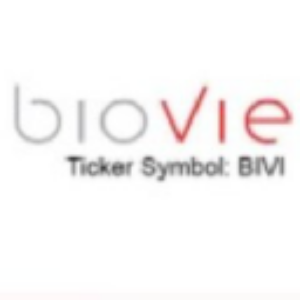BioVie to Host Virtual KOL Event to Discuss the Phase 2 Study of Bezisterim for the Treatment of Parkinson's Disease on May 28, 2025
Rhea-AI Summary
BioVie (NASDAQ: BIVI) announced a virtual Key Opinion Leader (KOL) event scheduled for May 28, 2025, focusing on their Phase 2 trial of bezisterim (NE3107) for Parkinson's disease treatment. The event will feature experts Dr. Suzanne de la Monte from Brown University and Dr. Mark Stacy from Medical University of South Carolina.
The discussion will center on the SUNRISE-PD trial, which is currently enrolling newly diagnosed Parkinson's patients. Bezisterim is an oral small molecule designed to reverse insulin resistance and selectively inhibit inflammation-driven processes. The study aims to evaluate the drug's impact on clinical signs and biomarkers potentially related to disease modification.
Positive
- None.
Negative
- None.
News Market Reaction
On the day this news was published, BIVI gained 2.80%, reflecting a moderate positive market reaction.
Data tracked by StockTitan Argus on the day of publication.
CARSON CITY, Nev., May 14, 2025 (GLOBE NEWSWIRE) -- BioVie Inc. (NASDAQ: BIVI), (“BioVie” or the “Company”), a clinical-stage company developing innovative drug therapies for the treatment of neurological and neurodegenerative disorders and advanced liver disease, today announced that it will host a virtual key opinion leader (KOL) event featuring Suzanne de la Monte, MD, MPH (Brown University Warren Alpert Medical School, Providence VA Medical Center) and Mark Stacy, MD (Medical University of South Carolina College of Medicine), who will join company management to discuss the unmet need and current treatment landscape for Parkinson's disease on Wednesday, May 28, 2025 at 12:00 PM ET. To register, click here.
The event will provide an update on BioVie's Phase 2 trial (SUNRISE-PD; sunrisepd.com) evaluating bezisterim (NE3107) for the treatment of Parkinson's disease. Bezisterim is a novel, orally-administered small molecule that has been shown to reverse insulin resistance and selectively inhibit inflammation-driven ERK- and NF-κB-stimulated inflammatory mediators without inhibiting their homeostatic functions. Inflammation and the associated insulin resistance are important to the presentation of Parkinson's symptoms. BioVie is currently enrolling patients recently diagnosed with Parkinson's disease who have not yet begun treatment in order to measure bezisterim’s potential impact on clinical signs and effects on biomarkers that may correlate with disease-modification for the SUNRISE-PD trial.
A live question and answer session will follow the formal presentations.
About Suzanne de la Monte, MD, MPH
Suzanne de la Monte, MD, MPH is Professor in Pathology and Laboratory Medicine, Neurology, & Neurosurgery at the Warren Alpert Medical School of Brown University and Chief of Pathology & Laboratory Medicine at the Providence VA Medical Center. Dr. de la Monte is also a medical staff member at the Rhode Island Hospital and Women and Infants Hospital of Rhode Island and formerly a research fellow at the National Institutes of Health. She received residency training in Anatomic and Pediatric Pathology at Johns Hopkins and fellowship training in Neuropathology at the Massachusetts General Hospital (MGH). Dr. de la Monte leads programs in basic, translational, and clinical research on mechanisms and the neurological consequences of brain insulin resistance and metabolic dysfunction, and coined the term ‘Type 3 Diabetes’ which refers to the hypothesis that insulin resistance in the brain causes neurodegenerative disorders. She has over 300 peer-reviewed articles published.
About Mark Stacy, MD
Mark Stacy, MD is a Professor in the College of Medicine at Medical University of South Carolina. He received his MD from the University of Missouri, Columbia, Missouri, and completed his residency training at Hahnemann (Drexel) University. Dr. Stacy also has a fellowship in Movement Disorders at Baylor College of Medicine. His prior positions include assistant professor at University of Missouri, Director of the Muhammad Ali Parkinson Research Center at the Barrow Neurological Institute in Phoenix, Arizona, and Director and subsequently Vice Dean of Parkinson Disease and Movement Disorders at Duke University. Dr. Stacy also completed a sabbatical in the Human Motor Control Section at the National Institutes of Health and served as Dean of Brody School of Medicine and Vice Chancellor of the Division of Health Sciences at East Carolina University from 2017 – 2021. He has published more than 300 journal articles and book chapters on the topics of clinical and neurobiological aspects, complications, and treatment options in Parkinson Disease; dystonia; Tourette’s syndrome; and movement disorders.
About Parkinson’s Disease
Parkinson’s disease (PD) is a progressive neurodegenerative disorder that primarily affects movement. It is characterized by the loss of dopamine-producing neurons in the substantia nigra, a region of the brain critical for motor control. Core symptoms include tremors, muscle rigidity, bradykinesia (slowness of movement), postural instability, and difficulties with speech.1-2 Non-motor symptoms, such as cognitive impairment, mood disorders, and autonomic dysfunction, also significantly impact patients' quality of life.3 In the early stages, symptoms are often mild and may include subtle tremors, slight movement difficulties, and changes in handwriting or facial expressions. As the disease progresses, motor symptoms become more pronounced, leading to difficulties with balance, speech, and daily activities, often requiring full-time care in later stages.4
Since the 1960s, when dopamine’s critical role in Parkinson’s disease was first identified, levodopa has remained the cornerstone of treatment, providing significant symptom relief by replenishing dopamine levels in the brain.5-6 However, long-term use is associated with complications such as motor fluctuations—where symptom control becomes less stable—and dyskinesia, involuntary movements that can become debilitating.7-9
Emerging research highlights the role of chronic inflammation and insulin resistance in the onset and progression of Parkinson’s disease. Neuroinflammation, driven by activated microglia and elevated levels of pro-inflammatory cytokines, contributes to oxidative stress and accelerates neuronal degeneration.10-12 Additionally, insulin resistance, which impairs the brain’s ability to regulate glucose metabolism, has been linked to increased neurodegeneration and worsening motor symptoms.13-14 These metabolic dysfunctions create a harmful cycle that exacerbates disease progression, underscoring the potential of anti-inflammatory and insulin-sensitizing therapies as new avenues for treatment.
About Bezisterim
Bezisterim (NE3107) is an orally bioavailable, blood-brain barrier (BBB)-permeable modulator of inflammation and insulin-sensitizer. In addition, it is not immunosuppressive and has a low risk of drug-drug interaction. By binding to ERK and selectively modulating NFκB activation and TNF-α production, BioVie believes that bezisterim may offer clinical improvements in several disease indications, including Alzheimer’s disease, Parkinson’s disease and long COVID.
In Parkinson’s disease, BioVie is currently enrolling patients in the Phase 2 SUNRISE-PD clinical trial evaluating the safety and efficacy of bezisterim on motor and non-motor symptoms in patients who have not been treated with carbidopa/levodopa, with topline data expected in late 2025 or early 2026. A previous Phase 2 study of bezisterim in Parkinson’s disease (NCT05083260) completed in 2022, and data presented at the AD/PD™ 2023 International Conference on Alzheimer’s and Parkinson’s Diseases and related neurological disorders in Gothenburg, Sweden in March 2023 showed significant improvements in “morning on” symptoms and clinically meaningful improvement in motor control in patients treated with a combination of bezisterim and levodopa versus patients treated with levodopa alone, and no drug-related adverse events.
In long COVID, bezisterim has the potential to reduce neurological symptoms including fatigue and cognitive dysfunction. Persistently circulating viral spike proteins are believed to trigger TLR-4 driven activation of NFκB and the subsequent expression of inflammatory cytokines (IL-6, TNF, IFNg). BioVIe’s Phase 2 ADDRESS-LC study, is a randomized (1:1), placebo-controlled, multicenter trial in approximately 200 patients to evaluate the safety, tolerability and potential efficacy of 3 months of treatment with bezisterim to reduce the neurocognitive symptoms associated with long COVID, including difficulty concentrating or remembering things (“brain fog”) and fatigue.
In Alzheimer’s disease, BioVie conducted and reported efficacy data on its Phase 3 randomized, double-blind, placebo-controlled, parallel-group, multicenter study to evaluate bezisterim in patients who have mild-to-moderate Alzheimer’s disease (NCT04669028) in 2023. Results of a Phase 2 investigator-initiated trial (NCT05227820) showing bezisterim-treated patients experienced improved cognition and biomarker levels were presented at the Clinical Trials on Alzheimer’s Disease (CTAD) annual conference in December 2022. An estimated six million Americans suffer from Alzheimer’s disease.
About BioVie Inc.
BioVie Inc. (NASDAQ: BIVI) is a clinical-stage company developing innovative drug therapies for the treatment of neurological and neurodegenerative disorders (Long COVID, Alzheimer's disease and Parkinson’s disease) and advanced liver disease. In neurodegenerative disease, the Company’s drug candidate bezisterim inhibits inflammatory activation of extracellular signal-regulated kinase and the transcription factor nuclear factor-kB, and the associated neuroinflammation and insulin resistance but not ERK and NFkB homeostatic functions (e.g., insulin signaling and neuron growth and survival). Both neuroinflammation and insulin resistance are drivers of AD and PD. Persistent systematic inflammation and neuroinflammation are key features in patients with neurological symptoms of Long COVID. In liver disease, the Company’s Orphan drug candidate BIV201 (continuous infusion terlipressin), with FDA Fast Track status, is being evaluated and discussed with guidance received from the FDA regarding the design of Phase 3 clinical testing of BIV201 for the reduction of further decompensation in participants with liver cirrhosis and ascites. The active agent is approved in the U.S. and in about 40 countries for related complications of advanced liver cirrhosis. For more information, visit www.bioviepharma.com .
References
1 Cleveland Clinic. Parkinson’s Disease. Last reviewed: 2022 Apr 15.
2 Jankovic J. J Neurol Neurosurg Psychiatry. 2008;79(4):368-376.
3 Postuma RB, Berg D, Stern M, et al. Mov Disord. 2015;30(12):1591-1601.
4 Kalia LV and Lang AE. Lancet. 2015;386(9996):896-912.
5 Hornykiewicz O. Angew Chem Int Ed. 2002;41(17):2934-2941.
6 Olanow CW, Obeso JA and Stocchi F. Lancet Neurol. 2006;5(8):677-687.
7 Ahlskog JE and Muenter MD. Mov Disord. 2001;16(3):448-458.
8 Espay AJ, Morgante F, Merola A, et al. Ann Neurol. 2018;84(6):797-811.
9 Cilia R and Akpalu A. J Neural Transm. 2020;127(5):889-916.
10 Jurcau A, Andronie-Cioara FL, Nistor-Cseppento DC, et al. Int J Mol Sci. 2023;24:14582.
11 Pajares M, Rojo AI, Manda G, et al. Cells. 2020;9:1687.
12 Isik S, Kiyak BY, Akbayir R, et al. Cells. 2023;12:1012.
13 Zagare A, Hemedan A, Almeida C, et al. Mov Disord. 2025;40(1):67-76.
14 Ruiz-Pozo VA, Tamayo-Trujillo R, Cadena-Ullauri S, et al. Nutrients. 2023;15(16):3585.
Forward-Looking Statements
This press release contains forward-looking statements, which may be identified by words such as "expect," "look forward to," "anticipate" "intend," "plan," "believe," "seek," "estimate," "will," "project" or words of similar meaning. Although BioVie Inc. believes such forward-looking statements are based on reasonable assumptions, it can give no assurance that its expectations will be attained. Actual results may vary materially from those expressed or implied by the statements herein due to the Company's ability to successfully raise sufficient capital on reasonable terms or at all, available cash on hand and contractual and statutory limitations that could impair our ability to pay future dividends, our ability to complete our pre-clinical or clinical studies and to obtain approval for our product candidates, our ability to successfully defend potential future litigation, changes in local or national economic conditions as well as various additional risks, many of which are now unknown and generally out of the Company's control, and which are detailed from time to time in reports filed by the Company with the SEC, including quarterly reports on Form 10-Q, reports on Form 8-K and annual reports on Form 10-K. BioVie Inc. does not undertake any duty to update any statements contained herein (including any forward-looking statements), except as required by law.
For Investor Relations Inquiries:
Bruce Mackle
Managing Director, LifeSci Advisors, LLC
bmackle@lifesciadvisors.com
For Media Relations Inquiries:
Melyssa Weible
Managing Partner, Elixir Health Public Relations
mweible@elixirhealthpr.com








